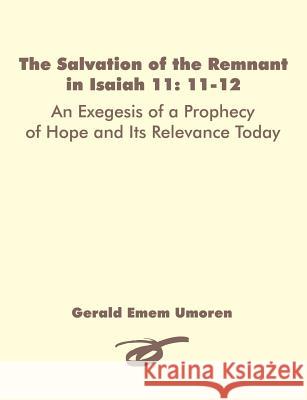The Salvation of the Remnant in Isaiah 11: 11-12: An Exegesis of a Prophecy of Hope and Its Relevance Today » książka
The Salvation of the Remnant in Isaiah 11: 11-12: An Exegesis of a Prophecy of Hope and Its Relevance Today
ISBN-13: 9781581123753 / Angielski / Miękka / 2007 / 316 str.
The Salvation of the Remnant in Isaiah 11: 11-12: An Exegesis of a Prophecy of Hope and Its Relevance Today
ISBN-13: 9781581123753 / Angielski / Miękka / 2007 / 316 str.
(netto: 144,60 VAT: 5%)
Najniższa cena z 30 dni: 151,83
ok. 16-18 dni roboczych
Bez gwarancji dostawy przed świętami
Darmowa dostawa!
Experience confirms that every believer has a daily challenge of how to appreciate and understand the disposition of his God in times of faith crises, great difficulty, trials and near hopelessness. Some would even ask: "Did God ever have a plan of salvation? If so, is it working at all?" Cognisant of the fact that a Biblical example could be the best way of appreciating the disposition of God at difficult times, the remnant motif in the Old Testament and especially in Isaiah presented some attractive issues that, if explored, could offer useful insights into the divine plan. As a response to this situation, this dissertation, which scored a summa grade on presentation to the Biblical section of the Faculty of Theology of the Pontifical University of St. Thomas, Rome, is basically an exegetico-theological inquiry into the meaning and possible implication of Is. 11: 11-12 which proposes the salvation of the remnant. Given the relevance of Isaiah and his prophecy to contemporary belief in God, this work seeks, in the context of his prophecy, to discover how an immutable God related with the remnant of His people in the past, as a ground for better appreciation of similar contemporary/future God-believer relationship. It dwells extensively on the meaning of the remnant motif in Isaiah and examines the nature and import of this type of salvation. With the disobedience of the Israelites to the terms of the covenant, and their consequent judgement by God, many of them had lost the hope of gaining salvation from God. But the prophet courageously confronted this crisis of faith and specially addressed the situation of despair with this prophecy of hope that proves to be relevant even today. It is from the results of this examination that conclusions, which basically propose a theology of hope, are drawn. Going methodologically from this point of view, there are proposals that make the work ever more relevant not only to the Biblical academia, but, better still, to all believers today.
Experience confirms that every believer has a daily challenge of how to appreciate and understand the disposition of his God in times of faith crises, great difficulty, trials and near hopelessness. Some would even ask: "Did God ever have a plan of salvation? If so, is it working at all?" Cognisant of the fact that a Biblical example could be the best way of appreciating the disposition of God at difficult times, the remnant motif in the Old Testament and especially in Isaiah presented some attractive issues that, if explored, could offer useful insights into the divine plan.As a response to this situation, this dissertation, which scored a summa grade on presentation to the Biblical section of the Faculty of Theology of the Pontifical University of St. Thomas, Rome, is basically an exegetico-theological inquiry into the meaning and possible implication of Is. 11: 11-12 which proposes the salvation of the remnant.Given the relevance of Isaiah and his prophecy to contemporary belief in God, this work seeks, in the context of his prophecy, to discover how an immutable God related with the remnant of His people in the past, as a ground for better appreciation of similar contemporary/future God-believer relationship. It dwells extensively on the meaning of the remnant motif in Isaiah and examines the nature and import of this type of salvation. With the disobedience of the Israelites to the terms of the covenant, and their consequent judgement by God, many of them had lost the hope of gaining salvation from God. But the prophet courageously confronted this crisis of faith and specially addressed the situation of despair with this prophecy of hope that proves to be relevant even today.It is from the results of this examination that conclusions, which basically propose a theology of hope, are drawn. Going methodologically from this point of view, there are proposals that make the work ever more relevant not only to the Biblical academia, but, better still, to all believers today.











